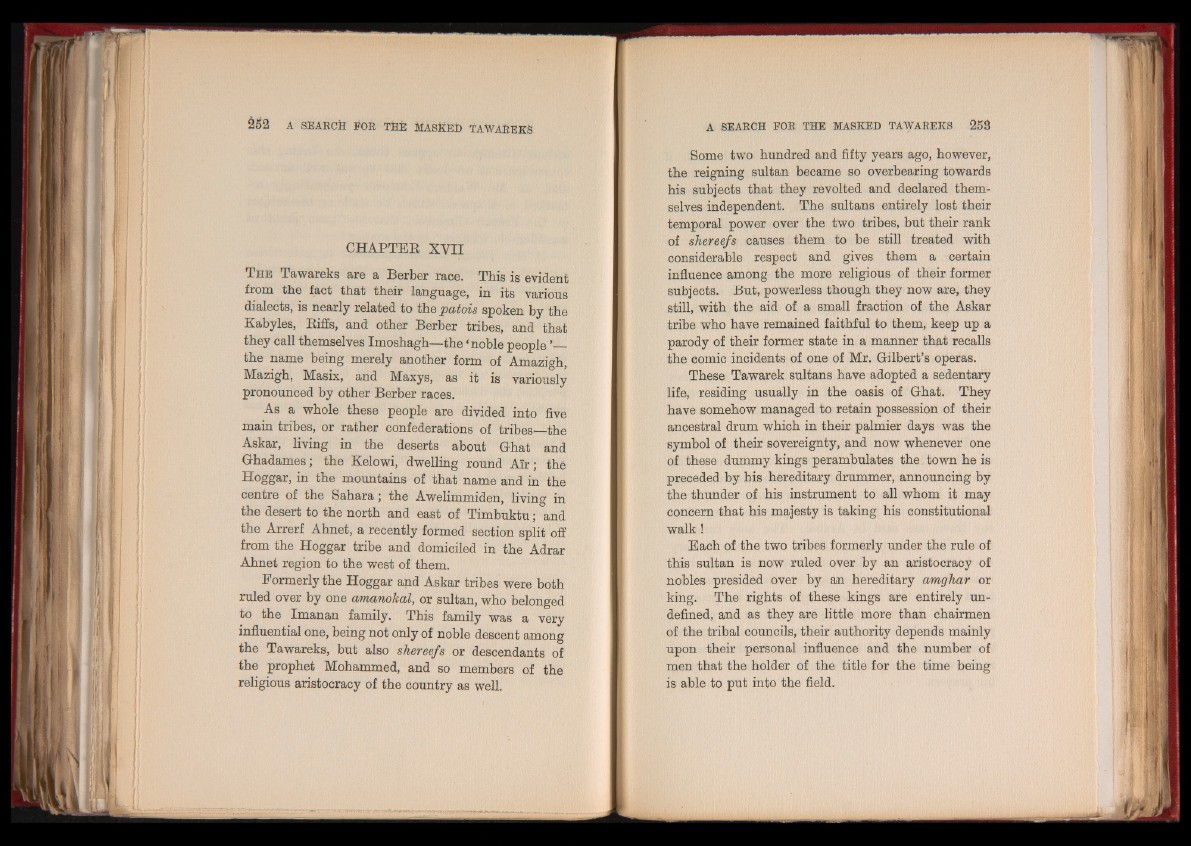
CHAPTER XYII
T h e Tawareks are a Berber race. This is evident
from the fact that their language, in its various
dialects, is nearly related to the patois spoken by the
Kabyles, Riffs, and other Berber tribes, and that
they call themselves Imoshagh—the ‘noble people
the name being merely another form of Amazigh,
Mazigh, Masix, and Maxys, as it is variously
pronounced by other Berber races.
As a whole these people are divided into five
main tribes, or rather confederations of tribes—the
Askar, living in the deserts about Ghat and
Ghadames ; the Kelowi, dwelling round Air ; thè
Hoggar, in the mountains of that name and in the
centre of the Sahara the Awelimmiden, living in
the desert to the north and east of Timbuktu ; and
the Arrerf Ahnet, a recently formed section split off
from the Hoggar tribe and domiciled in the Adrar
Ahnet region to the west of them.
Eormerly the Hoggar and Askar tribes were both
ruled over by one amanokal, or sultan, who belonged
to the Imanan family. This family was a very
influential one, being not only of noble descent among
the Tawareks, but also sheree/s or descendants of
the prophet Mohammed, and so members of the
religious aristocracy of the country as well.
Some two hundred and fifty years ago, however,
the reigning sultan became so overbearing towards
his subjects that they revolted and declared themselves
independent. The sultans entirely lost their
temporal power over the two tribes, but their rank
of shereefs causes them to be still treated with
considerable respect and gives them a certain
influence among the more religious of their former
subjects. But, powerless though they now are, they
still, with the aid of a small fraction of the Askar
tribe who have remained faithful to them, keep up a
parody of their former state in a manner that recalls
the comic incidents of one of Mr. Gilbert’s operas.
These Tawarek sultans have adopted a sedentary
life, residing usually in the oasis of Ghat. They
have somehow managed to retain possession of their
ancestral drum which in their palmier days was the
symbol of their sovereignty, and now whenever one
of these dummy kings perambulates the town he is
preceded by his hereditary drummer, announcing by
the thunder of his instrument to all whom it may
concern that his majesty is taking his constitutional
walk !
Each of the two tribes formerly under the rule of
this sultan is now ruled over by an aristocracy of
nobles presided over by an hereditary amghar or
king. The rights of these kings are entirely undefined,
and as they are little more than chairmen
of the tribal councils, their authority depends mainly
upon their personal influence and the number of
men that the holder of the title for the time being
is able to put into the field.